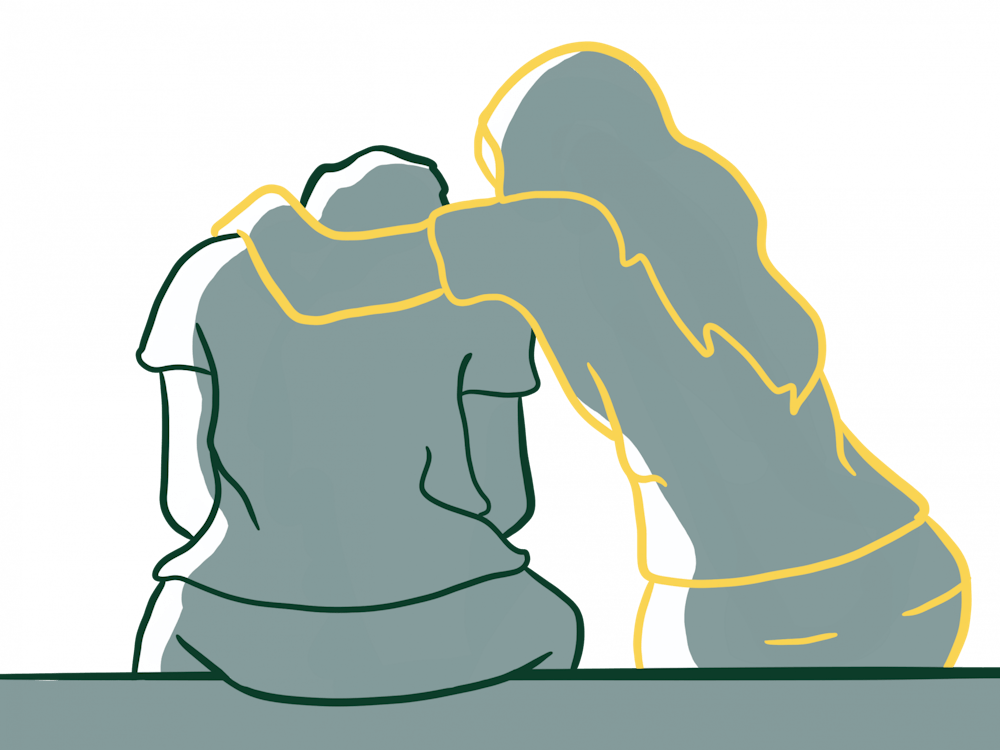I honestly thought I hated my job. I am not much of a "people person," nor do I have any spectacular culinary talents. So I'm not really sure what possessed me to work as a waitress and chef's assistant in a nursing home. Maybe it was the pay, or the flexible hours. Or maybe it was the opportunity to play an important role in bettering someone's day.
Nah. It was the pay.
However, I didn't realize how much someone could truly despise their job until I spoke with one of the nurses. As I was living out the height of luxury, carrying plates of cubed steak and mashed potatoes to individuals who had forgotten what a potato was, I made a comment about how depressing it was to see these people so confused. The nurse sitting next to me decided to respond with the following sentiment: "It's only sad if you think of them as people."'
Now, again, I am not much of a "people person," but even I know that is, simply put, a very crappy thing for a personal health care professional to say about their patients.
These people had clearly lived full lives. The idea that the terms "patients" and "people" were not one and the same left a sour taste in my mouth. We were working at a nursing home, a place where it was our job to make these residents feel like people again. And this nurse was doing just the opposite. It was this strong desire to prove this woman wrong that urged me to start sitting down and talking to the residents. I wanted to learn about their lives. The more I could discover, the more I could distinguish them from the objects that the nurse had labeled them as. She was wrong -- these people weren't just a task to complete, they were human beings, and I was determined to prove it.
So, in between orders of Diet Cokes and a lot of cottage cheese, I started writing down the lives of those I waited on. This is what I found.
Table 3: Chicken salad on a bun and a Diet Coke
The first person I talked to was a broad-shouldered man who always sat at the large table in the center of the main dining room, and had served in World War II. Some days he said he was in the Navy, and other days he said he was part of the Air Force. I found that to be the case with a lot of the residents: While the majority of their stories stayed the same, small (or somewhat large) details seemed to vary depending on their mood, what time of the day it was or even how fast I was able to bring them their soup.
In any case, this man had fiery stories of wartime glory -- bullets whizzing past his ears, screams of his fellow soldiers as they ran into battle. When I asked how he was doing, he claimed to be better than the day he almost got blown up. Every now and then, he would get a distant look in his eyes. One time, when I asked him what he was thinking about, he simply said, "Almost dying, but then I didn't."
Most people would assume that living through such horror stories would leave a person bitter and angry, but that wasn't true of the man at Table 3. Never have I seen a person more passionate and dedicated to his country. He managed to scream the word "American!" in every conversation he had, no matter how little relevance the word had. He spoke of his time in the military with fondness, as if he wanted to go back. Even though he had lost his leg in battle, he claimed he would do it again in a heartbeat.
"We are the reason you all are here today," he would lecture me as I handed him his food. "I'm more proud of this than anything -- more than being a family man, more than being a father, I am an American. American!"
Just in case I didn't believe him, he lifted up his pant leg to show me his prosthetic leg, the red and white stripes of the U.S. flag printed all across his plastic limb.
Enjoy what you're reading?
Signup for our newsletter
American, indeed.
Table 6: Hamburger, tomato soup and a lemonade
Another resident I waited on was a small woman who always wore the same pair of sparkly gray tennis shoes. She had a sharp wit, and always teased whomever was waiting on her table. This woman saw that, unlike most of the nurses, I was actually talking to residents, and she promptly decided that I would become her new best friend.
She was notorious in the dining hall for frustrating other residents. Due to her advanced dementia, it was common for this woman to ask about her husband multiple times a day.
To this day, I still have no idea where or who her husband was, but according to my boss, I was supposed to tell her that her husband would come to visit her the next morning.
Sometimes, the conversations we had were lighter. She often reminded me not to do any more cartwheels down the hallway. I decided not to remind her that I have the coordination of a 2-hour-old giraffe and no ability whatsoever to do a cartwheel. Most days, though, we spoke about her husband and when he would be coming back.
One day, this woman seemed particularly alert. She began to ask me about my education, and revealed to me that she used to be a professor at Ohio University. She told me stories of taking her students to Italy every year and all the incredible adventures she had there. Her stories shocked me, and I could not believe that the woman many residents saw as "barely there" had such incredible and intelligent stories.
Maybe 10 minutes after our conversation, she asked me for my name, and if I knew where her husband was.
Table 1: Two Reuben sandwiches, both with a side of cottage cheese and Table 13: Cheeseburger with onions and Swiss cheese only, root beer float
In the dining room, it was common for residents to sit together and mingle. The same group of women always sat together and played cards, and a group of men always sat at the bar to watch whatever golf tournament was on TV.
Sometimes, however, more intimate relationships emerged, which was originally the case at Table 13.
The man and woman at Table 13 met at the nursing home. They were inseparable and always held hands when they were eating. Other than that, they kept the PDA minimal, like shy and awkward middle school children on their first date. The man of the table was absolutely smitten with "his gal," as he called her, and she seemed to be just as happy.
The drama started to happen when Mr. Table 13 left for a week, to spend time with his family. His poor "gal" was left alone and, in a surprising turn of events, decided to take comfort in the arms of someone else. Cue the gasps.
While her boy toy was gone, this woman found herself a frequent visitor at Table 1, and bonded with a gentleman there over their shared love of cottage cheese. Soon, the two of them would sneak off to the hallway, and some of my colleagues caught them in some compromising situations. Even after Mr. Table 13 got back, this woman still chose to stay with Table 1. When I asked her about that, she told me something that still haunts me to this day. According to her, Table 1 had a bigger dick than Table 13.
Table 9: Grilled ham and cheese sandwich, a tall iced tea with no ice and a straw; on Sundays, a scoop of butter pecan ice cream
I don't believe I have ever met a more adorable human being than the lady who sat at Table 9. Every day, she would have me walk her back to the kitchen so she could thank the chef and give him a kiss on the cheek. This was often her greeting -- to friends and strangers alike. She always had to have one pink piece in her outfit, whether it was her scarf, her pink bedazzled cane or the pink birthday tiara she wore every other day.
When it actually was her birthday, she acted just like the princess she was. She wanted a glass of rose, and when I told her all we had was pinot noir and pinot grigio, she asked for some white wine with a drop of pink lemonade powder. She called it her "makeshift sangria" and declared that it was the "best damn drink" that I ever made her.
One day, she brought her makeup bag to the table. Once the rest of the dining room had slowed down, she asked me if I would help her with her makeup. She explained that she used to be a model in St. Louis, and often taught other models how to do their makeup. However, when she tried to explain to her nurses how to help her put on her makeup, they wouldn't listen to her.
"You have good eyes, so I'll take your help," she told me, unloading all her supplies. "But I'll have to teach you how to fix eyebrows. And those lips too."
It was this daily ritual that brought us closer together. She told me about her grandchildren and greatgrandchildren, and she specifically told me which ones were her favorites. She explained why she never dated again after she left her husband, simply whispering to her eyeshadow palette, "Once you've had the best, you won't settle for anything else."
She is a 97-year-old ray of sunshine, with the confidence, empathy and "star power," as she calls it, of Reese Witherspoon. Or at least, that's what she hopes.
"That 'Legally Blonde' lady is as cute as a button," she would often tell me. "I want to be her when I grow up."
Memory Care Rooms 141 and 142: Daily special, coffee and orange juice every morning
In the back of the building, there is a blocked-off door that requires a passcode to enter. Inside is the wing called the Memory Care Unit. This section of the building is set apart for residents whose disabilities require a 24-hour nurse, or, more commonly, residents who suffer so badly from dementia that they are unable to function with the rest of society.
I worked with people who had forgotten the name of the food they were eating, where their rooms were, or even that they were in a nursing home in the first place. One woman would often come up to me, trying to communicate, maybe trying to ask for more food.
I had trouble understanding her, however, because she had forgotten how to talk.
The only way she could let me know that she was hungry was by clapping her hands and pointing to her stomach while growling at me the whole time.
Two people who also confused me were the residents of Rooms 141 and 142. The man and the woman who lived in those rooms seemed to have no impairing mental issues. Sure, they forgot what day of the week it was every now and then, but so do I. So either I have super-early-onset dementia, or they were fine.
In fact, they seemed to realize that they were the only two residents in the wing who still had themselves together, and they migrated towards each other. Every morning, the man would come up to me and ask for two cups of decaf coffee and one glass of orange juice. The lady in Room 142 was too pretty to have to get up, he said, and he wanted to take care of her.
They interacted with each other like shy children, holding hands and giggling in the hallways. During meals, he would save her a seat and cut her food up for her. She wiped his face when he forgot to and always sought me out after lunch so that I could fix her hair.
"He told me I was the most beautiful woman he has ever seen," she would tell me, every day at noon on the dot. "Do you think that means he likes me?"
And every night, the man from Room 141 would muster up his courage and ask her if he could kiss her good night. Each day was like new for them, and I got to see them fall for each other over a three-month saga.
One day, I decided to ask one of the nurses what would happen when the two lovebirds wanted to take things further. They were obviously smitten with each other, and they seemed capable of handling themselves, so why continue to keep them in separate rooms?
This was when the nurse told me that the residents of Rooms 141 and 142 had actually been married for over 60 years. They had children, grandchildren and great-grandchildren together, and they hadn't spoken to their family in months. When their family did visit, it wouldn't really make a difference -- both of the residents would be plagued with a mind-numbing sense of guilt at their ability to not remember the so-called "strangers" that were visiting them. They had not been able to remember each other for the past 10 years.
The real miracle was that every day, they came back to each other. Every day, he saw her sitting in her room and brought her coffee and orange juice. They talked over meals of carefully cut-up food, and spent the day getting to know the person they had started a family with so many years ago. And at the end of every day, when they had fallen in love with each other again, their minds were wiped clean for the next day.
They acted like each day was the first day they met, each smile was the first smile, each kiss the first kiss. Because it was.
And it would never be anything more than that.
After I found this out, I was cleaning up from dinner when the man from Room 141 came up to me and asked what I used to think was a cute and innocent question.
"I think she likes me, don't you?" he said with a grin. "I think she might let me kiss her goodnight tonight!"
After this encounter, I asked to be taken off the Memory Care staff.
***
When I left for school at the end of the summer, I didn't imagine there would be much of a spectacle. I was just one of many servers in the building, and while I liked to think that I had connected with some of the residents, I didn't think my questions or attention were anything special.
I was surprised when a lot of the residents I had spoken with came to say goodbye on my last day. I was met with tears, which I had no idea how to handle, and lots of cheek-pinching. Turns out, I either look a lot like 20 different ladies' granddaughters, or I should meet 20 other ladies' grandsons.
I refused to let myself fall victim to the emotions until the woman from Table 9 held my hand and asked if she could come "bar-hopping" with me at school one weekend. The sheer idea of this hot-pink queen strutting up to Brick Street Bar with her bedazzled cane was enough to bring me to tears.
Was I excited to leave my notepad and half-apron behind? Of course I was. If I never had to have another conversation about whether or not the Jell-O was too "soupy," I would be a happy girl. But what I would miss were the people whose stories I got to learn. And after I clocked out of my last shift, I gave a copy of all my notes of the stories I got to hear to that nurse who told me how easy it was to think of these residents as less than people.
And if I also convinced some of the residents to throw their mashed potatoes at her, oh well. She had it coming.




